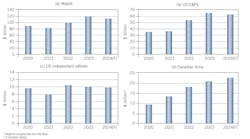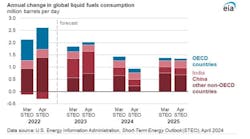Energy prices remained volatile in normally thin trading volumes between Christmas and New Year holidays at the close of 2004.
Still, said analysts in the Houston offices of Raymond James & Associates Inc., "It is no exaggeration to say that 2004 was an excellent year for the energy sector's fundamentals—one of the best ever, for the second consecutive year. A robust global economic expansion created a favorable demand environment, while supply of both crude oil and natural gas remained generally tight. This led to a substantial—and, we believe, fully sustainable—upward move in commodity prices."
In a Jan. 3 report, they predicted another banner year for the energy industry in 2005. "We believe that the oil markets have entered a new paradigm where minimal excess [Organization of Petroleum Exporting Countries] production capacity will likely lead to increased volatility, along with generally higher average prices for a lengthy period of time." Despite snowstorms across the US over the long Christmas holiday weekend, the heating oil market virtually collapsed Dec. 27 when the New York Mercantile Exchange reopened for trade to reports of sufficient supplies and forecasts of warmer weather. Heating oil for January delivery plunged by 11.53¢ to $1.21/gal—the sharpest decline in 14 years for a nonexpiring contract, analysts said. It pulled down other commodity prices in its wake. Technical trading drove the US dollar to a new low against the euro and the lowest level in nearly 3 weeks against the yen. The euro hit a new high of $1.364 on Dec. 27, while the dollar was trading at 103.03 yen. That reduced energy costs in Japan and Europe and weakened the buying power in European markets among OPEC members.
Inventory surprise
Energy prices rebounded slightly in a Dec. 28 market adjustment, then climbed Dec. 29 when traders were surprised by a report by the Energy Information Administration that US crude stocks fell by 800,000 bbl to 295.1 million bbl during the week ended Dec. 24, vs. Wall Street analysts' consensus expectations of a 200,000 bbl build. Distillate fuel inventories also fell by 800,000 bbl, to 119.1 million bbl in the same period, compared with analysts' expectations of a 500,000 bbl decline. Heating oil inventories actually declined by 900,000 bbl but were partially offset by increases in diesel fuel. US gasoline stocks increased by 900,000 bbl to 212.3 million bbl.
"Importantly, the drop in distillate inventories was essentially all attributable to the decline in imports vs. the prior week," said Robert S. Morris, Banc of America Securities LLC, New York, in a Jan. 3 report. "This is important since distillate imports were about one-half of what they typically average for January while total US distillate demand was up 7.1% over the past 4 weeks compared with 1 year ago. Distillate inventories normally build at at this time of year and thus the deficit relative to the 10-year average expanded to roughly 9% from 8% below normal the prior week, although the deficit in crude stocks narrowed to 2.1% from 3.1% below the 10-year average." US heating oil inventories remain about 20% below normal levels, Morris said.
Terrorist attacks
Two coordinated explosions Dec. 29 in Riyadh, the capital of Saudi Arabia, also rekindled traders' fears that terrorist attacks could disrupt supplies of Middle Eastern crude. According to reports, one person was killed when a car bomb exploded near the Saudi Arabian Interior Ministry, while a second car bomb was detonated in a street after its driver was unable to ram a military building. "There have been many terrorist attacks in Saudi Arabia in the past year, most recently on Dec. 6 against the US consulate in Jeddah," said Raymond James analysts in a Dec. 30 report. "While none of the Saudi attacks this year caused actual supply disruptions (as is continually the case in Iraq), the market is understandably worried about potential future sabotage against oil infrastructure," analysts said. They also noted, "Saudi oil infrastructure is among the most highly guarded in the world, so a major attack against production facilities or export terminals is very unlikely—indeed, it would be unprecedented."
Meanwhile, Morris at Banc of America reported Dec. 29, "With the exception of limited fuel deliveries to Indonesia's Aceh province, it appears at this time that only minor damage was sustained to oil production, refining, and transportation facilities in Southeast Asia as a result of the recent tsunamis." However, Thailand—one of the hardest hit nations—lowered its 2005 economic growth forecast to 5.7% from 6%, due to reduced expectations for tourism earnings, although increased government spending will offset some of that loss.

